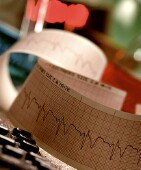
WEDNESDAY, Nov. 28 (HealthDay News) — The widely used heart drug digoxin is associated with an increased risk of death in people with the common heart rhythm disorder know as atrial fibrillation, a new study finds.
Researchers analyzed data from more than 4,000 patients with atrial fibrillation and found that digoxin was associated with a 41 percent increased risk of death from all causes, a 35 percent increased risk of death from cardiovascular causes, and a 61 percent increased risk of death from problems with the rate and rhythm of the heartbeat.
The findings mean that among patients with atrial fibrillation who take taking digoxin — compared to those not taking digoxin — one additional patient out of six will die from any cause over five years, one additional patient out of eight will die from cardiovascular causes, and one additional patient out of 16 will die from arrhythmias, the study authors said.
The study, led by Samy Claude Elayi, an associate professor of medicine at the Gill Heart Institute at the University of Kentucky, was published online Nov. 28 in the European Heart Journal.
Digoxin is found naturally in the foxglove plant, from which it is extracted. The drug helps the heart beat more strongly and with a more regular rhythm and is commonly used in both atrial fibrillation patients and heart failure patients. However, while the use of digoxin has been widely studied in heart failure patients, there’s been a lack of data about its use in patients with the irregular heartbeat, according to the study authors.
They said their findings call into the question the widespread use of digoxin in atrial fibrillation patients.
“These findings mean that physicians should try to control a patient’s heart rate by using alternatives as a first line, such as beta-blockers or calcium blockers; if digoxin is used, use a low dose with careful clinical follow-up, evaluate potential drug interactions when starting new medications, and monitor digoxin levels,” the authors said “Patients should be aware of potential toxicity and see their physicians immediately in specific clinical situations, for instance if they experience palpitations or syncope (fainting), as those may precede arrhythmic death,” they added.
The mechanism by which digoxin increased the risk of death in atrial fibrillation patients is unclear. And while the study noted an association between digoxin use and increased death risk in these patients, it could not prove a cause-and-effect relationship.
“Deaths from classic cardiovascular causes, whether due to arrhythmia or not, can partly but not entirely explain [the relationship],” Elayi and his colleagues wrote. “This suggests there must be some additional mechanism that remains to be identified.”
More information
The U.S. National Heart, Lung, and Blood Institute has more about atrial fibrillation.

